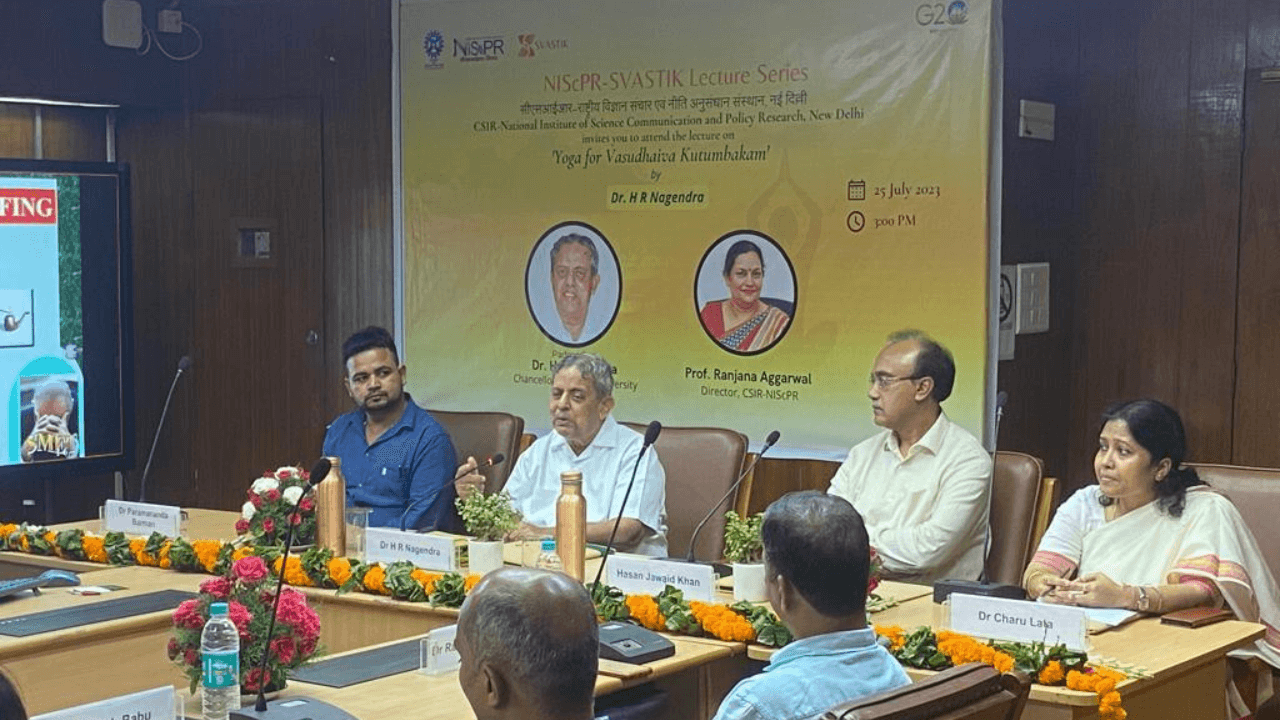CSIR-National Institute of Science Communication and Policy Research (NIScPR) recently held a lecture as part of its SVASTIK (Scientifically Validated Societal Traditional Knowledge) division. SVASTIK is an initiative monitored by the Prime Minister’s Office (PMO) and coordinated by CSIR-NIScPR. This lecture, titled “Yoga for Vasudhaiva Kutumbakam,” was the fourth session of the NIScPR-SVASTIK Lecture Series. The discussion focused on the importance of yoga in promoting the concept of “Vasudhaiva Kutumbakam,” which emphasizes the idea of the world as one big family.
More About the News
- The NIScPR-SVASTIK Lecture session was a significant event that brought together esteemed scholars, researchers, Yoga practitioners, and enthusiastic participants to explore the profound philosophy of Yoga and its relevance in promoting a global family.
- Shri Hasan Jawaid Khan, Chief Scientist, CSIR-NIScPR, warmly welcomed everyone and introduced SVASTIK, setting the stage for the enlightening discussions that followed.
- The keynote address by Padma Shri Dr. H R Nagendra, Chancellor of S-VYASA University, Bengaluru, was the highlight of the event.
- Dr. Nagendra’s vast knowledge and expertise in Yoga captivated the audience as he spoke about the transformative power of Yoga in uniting humanity and embracing the concept of ‘Vasudhaiva Kutumbakam.’
- His speech left the attendees inspired to integrate Yoga into their lives for personal and collective well-being.
- The program concluded with a vote of thanks by Dr. Charu Lata, Principal Scientist at CSIR-NIScPR.
Aim of the Event
- The event emphasized the importance of sharing evidence-based traditional practices and knowledge with the public to instill a sense of pride and confidence in our rich heritage.
- Under the guidance of Prof. Ranjana Aggarwal, Director CSIR-NIScPR, and a Steering Committee of experts, a team of scientists from CSIR-NIScPR launched the national initiative “SVASTIK” – Scientifically Validated Societal Traditional Knowledge.
- Through this initiative, simplified creative content on scientifically validated Indian traditional knowledge is being disseminated through digital platforms in English and various Indian languages.
- So far, 37 stories have been disseminated in 09 traditional knowledge domains in English and 17 Indian languages. SVASTIK can be accessed through @NIScPR_SVASTIK on popular social media platforms.
- 3 August Current Affairs 2023 in English
- MoU Between Subroto Mukerjee Sports and Education Society and All India Football Federation (AIFF) to Promote Football at Grassroot Level
- Dr. Mansukh Mandaviya Delivers Keynote Address at the 13th Indian Organ Donation Day ceremony
- Education Ministry Forms Expert Panel on Anti-Discrimination in Higher Education
- Concerns Arise Over Cheetah Deaths at Kuno National Park
FAQs
What is CSIR?
CSIR stands for Council of Scientific and Industrial Research. It is an autonomous agency under the Ministry of Science and Technology, Government of India. CSIR was established in 1942 with the mission to “promote the growth of science and technology for the betterment of the country.”
What are the objectives of CSIR?
The objectives of CSIR are:
To promote the growth of science and technology in India.
To undertake research and development in a wide range of fields.
To provide scientific and technical services to industry and other sectors.
To train scientists and technologists.
To promote the transfer of technology to industry.
To promote the growth of science and technology in India.
To undertake research and development in a wide range of fields.
To provide scientific and technical services to industry and other sectors.
To train scientists and technologists.
To promote the transfer of technology to industry.
